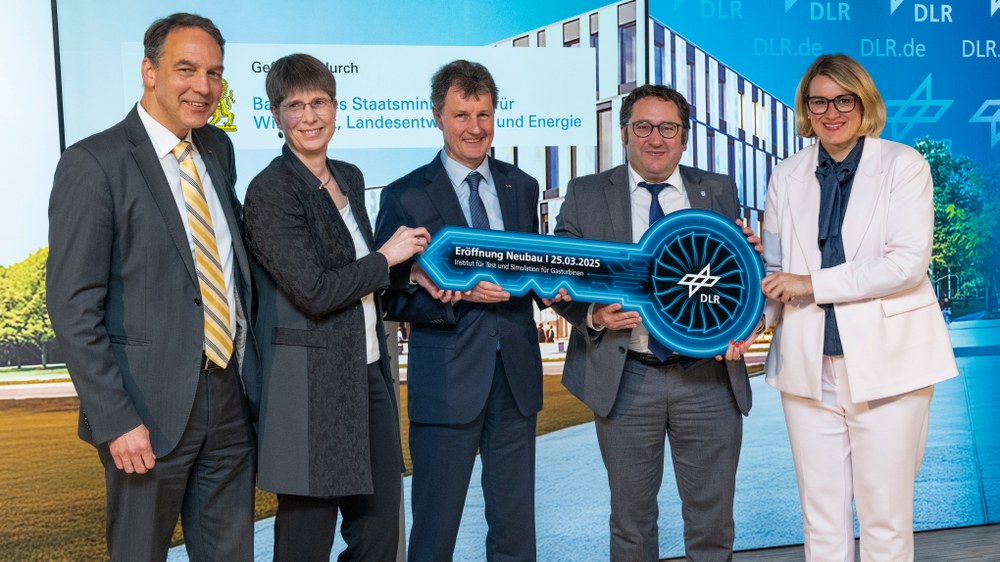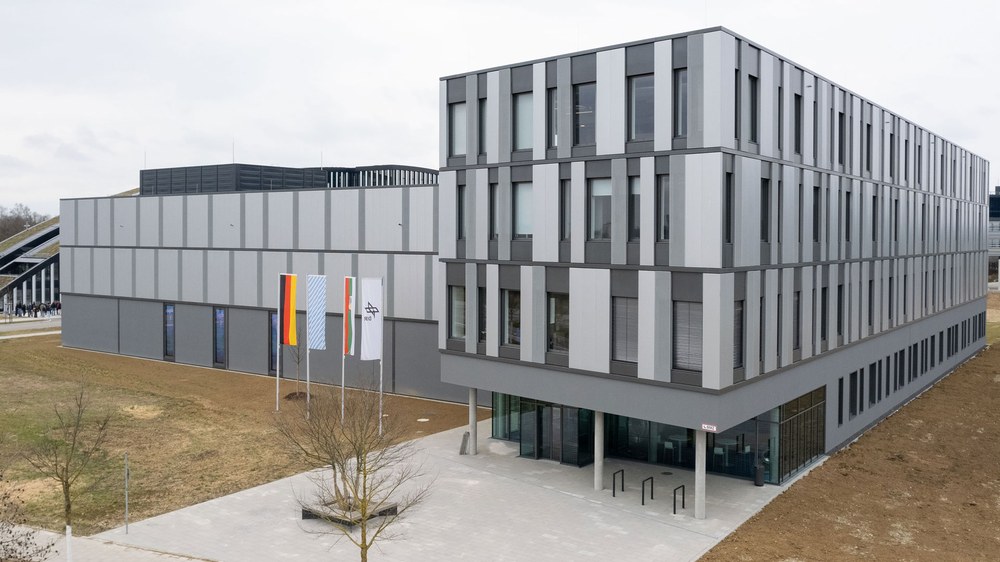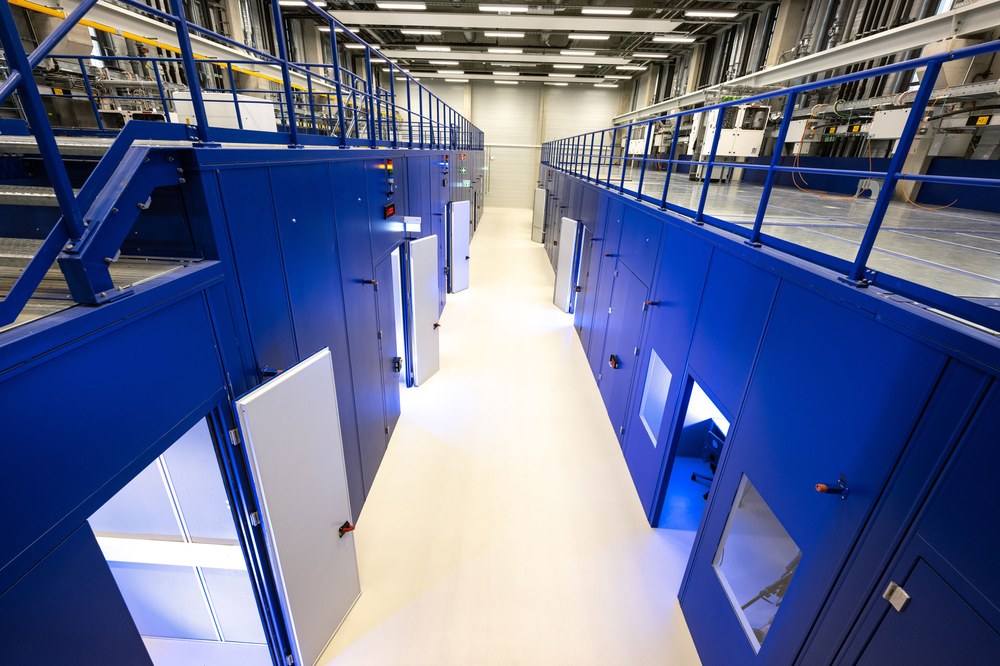DLR opens new home for climate-compatible aircraft engine research



- DLR has opened a new institute building in Augsburg with a unique test lab for innovative engine technology.
- At its heart are a set of test facilities with globally unique, digitally networked component test benches.
- Climate-compatible aviation requires the further development of gas turbines for use with new fuels, and improved efficiency.
- Focus: Aviation, climate-compatible flying, digitalisation
Gas turbines of the future will provide the thrust for climate-compatible aviation – that's the vision for the German Aerospace Center's (Deutsches Zentrum für Luft- und Raumfahrt; DLR's) new building in Augsburg. On 25 March 2025, the DLR Institute of Test and Simulation for Gas Turbines inaugurated its new home, offering attendees insights into its latest research and development work. At the heart of the new institute building are test facilities with globally unique, digitally networked component test benches. Alongside the construction of the test centre, the institute has also developed a comprehensive digital platform known as the 'virtual engine'.

I'm delighted that with the new institute building in Augsburg, we are also inaugurating a unique test lab for engine innovation. Developing climate-compatible and economically efficient propulsion technologies is part of our research mission and a societal responsibility. Thanks to these new facilities, the DLR Institute of Test and Simulation for Gas Turbines can now fully realise its potential and advance the digitalisation of aviation.
The opening ceremony welcomed approximately 60 guests from industry, research and politics, and was hosted by Markus Fischer, DLR's Divisional Board Member for Aeronautics, together with Tobias Gotthardt, State Secretary in the Bavarian State Ministry of Economic Affairs, Regional Development and Energy, and Sabine Ardey, Director of the DLR Institute of Test and Simulation for Gas Turbines.
Aerospace is a key economic driver and source of innovation in Augsburg and Bavaria. To further strengthen the region as a location for scientific research, Bavaria is investing around €65 million in the DLR Institute of Test and Simulation for Gas Turbines – a smart investment in the future. The institute offers unique testing capabilities and, with its research into highly efficient engines and the future use of hydrogen, is making a major contribution towards the transformation of aviation. We are ensuring competitiveness, driving innovation and once again demonstrating that Bavaria stands for a technological openness and cutting-edge research. The future of aerospace isn't being shaped just anywhere – it's happening right here in Bavaria.
Predicting service life with precision and reliably
The new address for the DLR institute is Forschungsallee 1 ('1 Research Lane') – and cutting-edge research is the order of the day here. In addition to offices and laboratories, the building houses a test hall equipped with various digitally networked testing machines. The institute's endurance testing facilities, which simulate real gas turbine conditions, are unique worldwide. Known as MTC test benches, they allow test objects to be subjected to long-term tests under extreme mechanical, thermal and chemical stresses – all at the same time. These new test stands enable even more precise and reliable determinations of engine component lifetimes.
Unique test environment for industry and research
The test results obtained on the test benches are also simultaneously represented in a digital twin, allowing researchers to simulate and validate component behaviour during testing. Another focus for the Augsburg researchers is the development of numerical methods and simulation models that precisely represent component processes and integrate them into the virtual engine. Together, this lays the foundation for improved design methods and the optimisation of future gas turbines.
The ultimate benefit of this research lies in the implementation of its findings. As such, close collaboration and ongoing exchange with industry are essential and have been intensively cultivated since the founding of the DLR Institute. MTU Aero Engines and Siemens Energy were involved in its definition phase and many more partners have since joined, including Rolls-Royce Germany. These collaborations focus on joint research and knowledge transfer, as well as training the next generation of talent for the industry.
Sustainable research
Gas turbines are essential to the energy transition, as they can convert chemically stored, renewable energy into mechanical and electrical power on large scales. This includes fuels such as hydrogen, ammonia and sustainable aviation fuels (SAF). Gas turbines are notable for their outstanding efficiency, compact design and robustness. Achieving climate-compatible aviation will require further efficiency improvements and the adoption of new fuels, and the researchers in Augsburg are developing the necessary technologies, materials and construction methods, which they can now test both physically and virtually.
The drive for sustainability and climate compatibility is not limited to the institute's research work. The new four-storey DLR building features an eco-efficient energy system, with six wells drilled on site to extract geothermal heat and cooling. These wells provide process cooling for the test benches and much of the building's heating – ensuring resource efficiency, sustainability and cost-effectiveness.
The construction of the building and the test centre was funded by the Bavarian State Ministry for Economic Affairs, Regional Development and Energy. The initial concept and initiative for the DLR Institute of Test and Simulation for Gas Turbines originated with Heinz Voggenreiter, Director of the DLR Institute of Structures and Design, and Jörg Eßlinger, Director of Materials at MTU Aero Engines.
